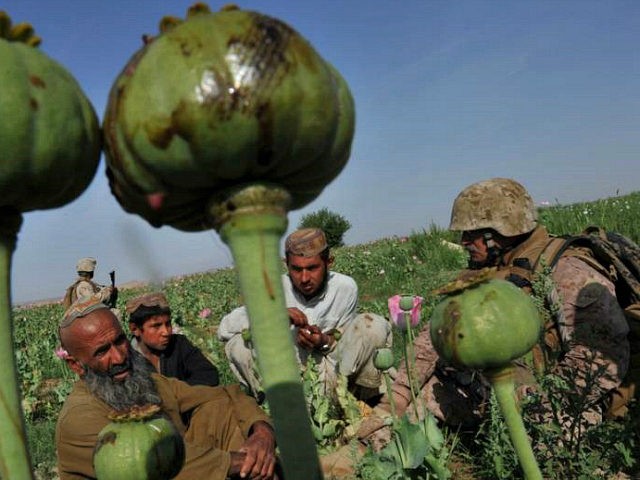Afghan farmers claim to have “no other choice” but to illegally grow poppies – a lucrative opium crop that fuels the country’s Taliban terror group – amid the economic downturn caused by the Chinese coronavirus pandemic, Radio Free Europe/Radio Liberty (RFE/RL) reported on Friday.
Farmers in Afghanistan growing poppies, a flower cultivated for the illicit opium trade, are blaming their illegal activities on the current coronavirus pandemic, which has caused a disruption in global supply and demand chains resulting in economic hardship for many countries. They argue that they have no profitable alternative to poppy cultivation.
In the country’s southern Kandahar Province, which borders Pakistan, farmers from Zhari district explained to RFE/RL why they grow the flower.
“We are growing poppies out of poverty. If we didn’t have to, we wouldn’t,” a farmer named Bahauddin told the news site.
“We grow them because there are no factories, the drought has hurt us, the [Chinese] coronavirus has hit the economy. We have no other choice but to grow poppies,” farmer Noor Agha said.
Afghanistan is the world’s top producer of opium, which in turn is used to make heroin. In 2018, the country produced 82 percent of the world’s opium supply, according to a 2019 U.N. drug report.
The recent drought referred to by farmer Agha has affected Afghanistan’s economy, according to the report, but not in the way he suggests. In 2018, a drought caused a decline in the cultivation and production of opium in Afghanistan, meaning the drought would not have forced Agha into poppy farming, but away from it. According to the U.N. data, opium prices in Afghanistan decreased between 2016 and 2018, likely due to overproduction in previous years, “making the crop less lucrative for farmers.”
The report insisted that despite the drought, “the area under [poppy] cultivation today [649,887 acres] is more than 60 percent larger than it was a decade ago and the estimated cultivation area in Afghanistan in 2018 [was] the second-largest estimate ever.”
The Taliban profits tremendously from Afghanistan’s illegal opium trade, worth up to $6.6 billion in 2017 according to the U.N. The terror group encourages farmers to plant poppies illegally, offering them protection from government authorities who try, in vain, to halt the practice. The militants then charge farmers taxes on the crop and use the funds to finance their operations.
The farmers interviewed by RFE/RL grew their poppies in Kandahar Province, technically controlled by Afghanistan’s government. However, as the report points out, the opium trade has fueled corruption within the government, with authorities either unwilling or unable to stop poppy farming while it is still controlled by the Taliban.
Afghanistan’s farmers have been encouraged by the U.S.-backed government to grow alternative food crops like wheat, fruit, and saffron in an attempt to move them away from poppy production.
“Kandahar’s provincial government, together with the Agriculture Ministry, has worked on policies to convince the farmers to find less dangerous, more long-term income sources,” Bahir Ahmad, spokesman for Kandahar Province’s governor, told RFE/RL.
These efforts have largely failed, however, because the opium trade, propped up the Taliban, is much more lucrative.

COMMENTS
Please let us know if you're having issues with commenting.